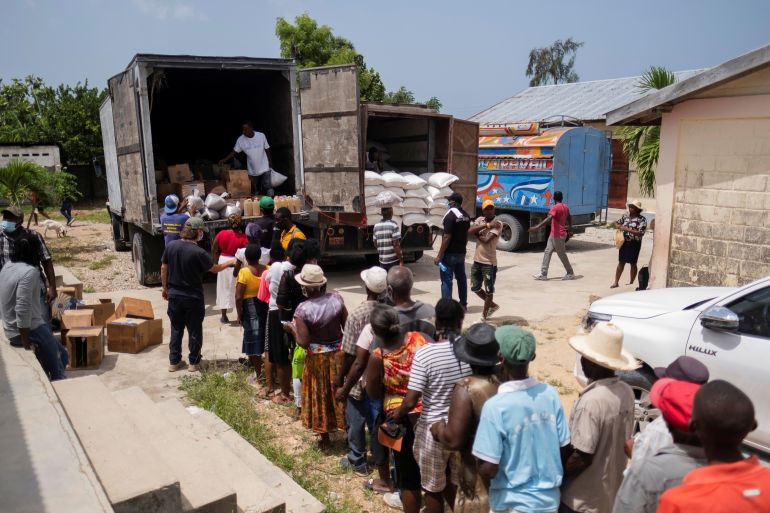Haiti: Why 2021 is and is not 2010
Haitian resistance is emerging against a repeat of the aid failures following the 2010 earthquake response.

After the 7.0-magnitude earthquake hit Haiti in 2010, the country was devastated and needed urgent assistance. The calamity killed at least 100,000 people and left hundreds of thousands homeless and millions in need of humanitarian aid. The subsequent reconstruction effort, however, quickly became synonymous with foreign dominance and the failures of humanitarian aid.
“It was like one day, we realised we weren’t here to ‘build back better’. So, we stopped trying or repeating the phrase,” an aid worker told me back in 2014. He was trying to justify why humanitarian organisations in Haiti were pushing $500 rental grants as a “housing solution” for homeless people, when what Haitians were really asking for was a home.
At the time, it did not matter that people had barricaded the entrance of their displacement camp to resist what his organisation was proposing as “solutions”. The Haitian police and UN peacekeepers were there to force their acceptance of the limited aid being offered.
It is now well known that the billions of dollars pledged to Haiti after its devastating earthquake were wasted by a self-serving humanitarian intervention. Most of the $6.4bn for reconstruction landed in the pockets of foreign contractors, UN agencies, the US military and international NGOs. Meanwhile, Haitians saw very little of the money.
The effects have been deadly. In the years after the earthquake, only 3.5 percent of international aid has been allocated to disaster prevention. Homelessness and food insecurity have been on the rise. For some, Haiti’s exploitation by the international aid industry is a scandal. For others, it is a crime.
When a 7.2-magnitude earthquake rocked Haiti’s southern coast in August and caused major destruction, it provoked the question: will 2021 be a repeat of 2010? Politically speaking, little has changed in terms of who holds power and authority in disaster responses. But the emergence of local resistance to the way humanitarians “do business” gives hope that change is possible.
Humanitarian ‘vultures’
Haiti is not a failed state, but an “aid state”. In a country where the US pulls the strings of its domestic and foreign policy, and emboldens corrupt elites, the UN and international NGOs have been positioned to maintain “minimal” thresholds of human survival for the local population.
It is not surprising this system causes more harm than good. Foreign donors and international organisations are virtually unaccountable for their decisions and programmes, and they are prone to working outside state authority and local demands. They are also incentivised to treat Black suffering as a business opportunity.
The international response to Haiti’s 2010 earthquake exemplified what Canadian author Naomi Klein has referred to as “disaster capitalism”. In recent years, many egregious cases of aid corruption, profiteering, negligence and exploitation have come to light, involving major donor agencies and NGOs.
Ultimately, these examples have pointed to the pursuit of profits over the survival needs of Haitians as a system-wide goal of the aid industry. In the early days, humanitarian organisations rushed blindly to accumulate as much donor funding as they possibly could, regardless of their experience, capacity or consideration of Haitian voices.
They went on to compete against one another for resources and mandates, and pursued “high tech, high visibility” projects as a way of raising capital for the “next” disaster. In displacement camps, many organisations prioritised “access” to corrupt state elites over solidarity with the people being targeted by state violence.
Resisting disaster capital
At some point, international organisations came to terms with the casualties of disaster capitalism and gave up on the goal of building back better. Certain policies, like giving homeless people one-off rental subsidies, were influenced by the idea that anything more sustainable was “unrealistic” for a place like Haiti.
Few have forgotten these experiences. The August 14 earthquake has touched off social media campaigns exposing past instances of aid corruption, under hashtags like #2021isnot2010. They have issued warnings to exercise vigilance against potential disaster profiteering and corruption, referring to international organisations as “vultures” and “thieves”.
Other campaigns are urging people to “give locally” with the aim to disrupt the everyday workings of the humanitarian establishment, and in turn, to give citizens more power to design programmes and strategies that meet their own demands. A collective of Haitian organisations has even developed a new code of conduct for disaster response. Among other provisions, it demands that anyone who operates in Haiti support the public good.
Already, this resistance is placing pressure on Haiti’s humanitarian industry, forcing recognition of Haitian capacity and leadership. But whether international promises to do things differently will reshape humanitarian behaviours remains to be seen. Local organisations still have limited access to global humanitarian financing, which anchors much of the decision-making power of international agencies.
Globally speaking, only two percent of Western-funded humanitarian aid goes to national and local organisations – a power imbalance that is a well-recognised source of harm but one that few are willing to rectify.
Regardless, this resistance challenges old tropes about the country’s helplessness. It exposes an organised effort by Haitian citizens to push power away from the centre and towards the people actually experiencing disasters. While reverberating locally, it is bound to have global effects on wider social movements and calls to “decolonise” the aid industry.
The views expressed in this article are the author’s own and do not necessarily reflect Al Jazeera’s editorial stance.
